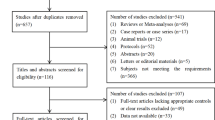Abstract
PURPOSE: To evaluate the influence of a H 2 receptor antagonist (cimetidine) on survival in patients with colorectal carcinoma, a randomized, controlled pilot study was performed in three university hospitals in Copenhagen, Denmark. METHODS: A total of 192 patients, who had undergone a resection or an exploratory operation for adenocarcinoma of the colon or rectum between May 1988 and May 1991, were enrolled in the study. After a median observation time of 40 months, outcome was noted for each patient concerning cancer-specific mortality rate. RESULTS: In patients operated with curative intent (n=148), no difference was found in cancer-specific mortality between the two treatments. However, a tendency toward reduction in mortality rate was found in patients with curatively operated Dukes Stage C carcinoma (P=0.11, log-rank test; difference, 29 percent; 90 percent confidence interval, 2 to 57 percent) in the cimetidine-treated group. In patients with disseminated disease no total difference was found between the two treatment groups. CONCLUSIONS: Cimetidine does not seem to reduce mortality in patients with colorectal cancer, but there seems to be a tendency toward a survival benefit in patients undergoing surgery for Dukes Stage C carcinoma. Results seem to justify trials in this patient catagory to reveal a benefit of H2 receptor antagonists in adjuvant therapy of colorectal carcinoma.
Similar content being viewed by others
References
Storm HH, Mandres T, Friis S, Bang S. Cancer incidence in Denmark 1989. Copenhagen: Danish Cancer Society, 1989;24.
Griffin MR, Bergstalh EJ, Coffey RJ, Beart RW Jr, Melton LJ III. Predictors of survival after curative resection of carcinoma of the colon and rectum. Cancer 1987;60: 2318–24.
Olson RM, Perencevich NP, Malcolm AW, Chaffey JT, Wilson RE. Patterns of recurrence following curative resection of adenocarcinoma of the colon and rectum. Cancer 1980;45:2969–74.
Svendsen LB, Sørensen C, Kjersgaard P, Meisner S, Kjærgård J. The influence of age upon curative operation for colorectal cancer. Int J Colorectal Dis 1989;4: 123–7.
Metzger U. Adjuvant therapy for colorectal carcinoma. World J Surg 1991;15:576–82.
Moertel CG, Fleming TR, MacDonald JS,et al. Levamisole and fluorouracil for adjuvant therapy of resected colon carcinoma. N Engl J Med 1990;322:352–8.
Wunderlich M, Schiessel R, Rainer H,et al. Effect of adjuvant chemotherapy—or immunotherapy on the prognosis of colorectal cancer operated for cure. Br J Surg 1985;(Suppl):S107-S110.
Barkla DH, Tutton PJ. Influence of histamine and serotonin antagonists on the growth of xenografted human colorectal tumors. J Natl Cancer Inst 1981;67:1207–11.
Burtin C, Noirot C, Scheinemann P, Galoppin L, Sabolovic D, Bernard P. Clinical improvement in advanced cancer disease after treatment combining histamine and H-2 antihistaminics (ranitidine and cimetidine). Eur J Cancer Clin Oncol 1988;24:161–7.
Gifford RR, Voss BV, Ferguson RM. Cimetidine protection against lethal tumor challenge in mice. Surgery 1981;90:344–51.
Osband ME, Shen Y, Schlesinger M,et al. Successful tumor immunotherapy with cimetidine in mice. Lancet 1981;1:636–8.
Tønnesen H, Knigge U, Bülow S,et al. Effect of cimetidine on survival after gastric cancer. Lancet 1988;2: 990–1.
Dukes CE. The classification of cancer of the rectum. J Pathol 1932;35:323–33.
Peto R, Pike MC, Armitage P,et al. Design and analysis of randomized clinical trials requiring prolonged observations of each patient. Br J Cancer 1976;34:585–612.
Machin D, Gardner MJ. Calculating confidence intervals for survival time analysis. BMJ 1988;296:1366–71.
Bartholeyn J, Fozard JR. Role of histamine in tumor development. Trends Pharmacol Sci 1985;6:123–5.
Garcia-Caballero M, Neugebauer E, Campos R, Nunez de Castro J, Vara-Thorbeck C. Increased histidine decarboxylase (HDC) activity in human colorectal cancer: results of a study on ten patients. Agents Actions 1988;23:357–60.
Moriarty CM, Stucky JL, Hamburger KW, Patil KD, Foley JF, Koefoot RR. Blood histamine and solid malignant tumors. J Cancer Res Clin Oncol 1988;114:588–92.
Cole WH, Humphrey L. Need for immunologic stimulation during immunosuppression produced by major cancer surgery. Ann Surg 1985;202:9–20.
Sugarbaker PH. A perspective on the clinical research strategies in carcinoma of the large bowel. World J Surg 1991;15:609–16.
Weese JL, Ottery FD, Emoto SE. Do operations facilitate tumor growth? An experimental model in rats. Surgery 1986;100:273–7.
Tilly BC, Terloolen LG, Remori R,et al. Histamine as a growth factor and chemoattractant for human carcinoma and melanoma cells: action through Ca2+- mobilizing H1 receptors. J Cell Biol 1990;110:1211–5.
Nielsen HJ, Hammer JH, Moesgaard F, Kehlet H. Possible role of histamine-2 receptor antagonists for adjuvant treatment in colorectal cancer. Eur J Surg 1991;157:437–41.
Balch CM, Dougherty PA, Cloud GA, Tilden AB. Prostaglandin E-2 mediated suppression of cellular immunity in colon cancer patients. Surgery 1984;95:71–6.
Kojima O, Fujita Y, Iwai N,et al. Studies on cell mediated immunity in patients with colorectal cancer: leucocyte migration inhibition test using allogenic 3 M KCl extract. Aust N Z J Surg 1981;51:434–9.
Hammer JH, Nielsen HJ, Moesgaard F, Kehlet H. Duration of postoperative immunosuppression assessed by repeated delayed type hypersensitivity skin tests. Eur Surg Res 1992;24:133–7.
Hansbrough JH, Zapata-Sirvent RL, Bender EM. Prevention of alterations in postoperative lymphocyte subpopulations by cimetidine and ibuprofen. Am J Surg 1986;151:249–55.
Windle R, Bell PR, Shaw D. Five years results of a randomized trial of adjuvant 5-fluorouracil and levamisole in colorectal cancer. Br J Surg 1987;74:569–72.
Laurie JA, Moertel CG, Fleming TR,et al. Surgical adjuvant therapy of the large bowel carcinoma: an evaluation of levamisole and the combination of levamisole and fluorouracil. J Clin Oncol 1989;7:1447–56.
Wanebo HJ, Jun MY, Strong EW, Oettgen H. T-cell deficiency in patients with squamous cell cancer of the head and neck. Am J Surg 1975;130:445–51.
Author information
Authors and Affiliations
Additional information
Read at the XII International Congress of Pharmacology, Winnipeg, Montreal, Canada, July, 1994.
Cimetidine and placebo tablets were supplied by GEA Ltd., Copenhagen, Denmark.
About this article
Cite this article
Svendsen, L.B., Ross, C., Knigge, U. et al. Cimetidine as an adjuvant treatment in colorectal cancer. Dis Colon Rectum 38, 514–518 (1995). https://doi.org/10.1007/BF02148852
Issue Date:
DOI: https://doi.org/10.1007/BF02148852




